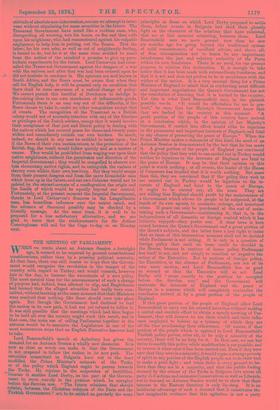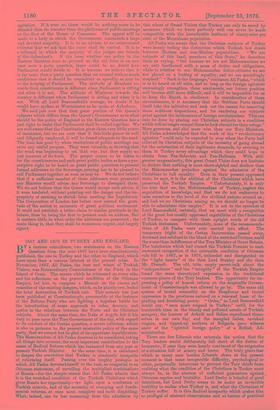THZ MEETIN,G OF PARLIAMENT.
WHEN we wrote about an Autumn Session a.fortnight ago, it seemed to be required by general, constitutional considerations, rather than by a pressing political necessity. At that time, there was still reason to hope that the Govern- ment would' recognise the revolution in the temper of the country with regard to Turkey, and would consent, however late in the day, to become the executants of a. new policy. The most natural time for the announcement of such a change of purpose had, indeed, been allowed to slip, and Englishmen had learned that the alleged atrocities had really been com- mitted, without learning at the same moment that their Ministers were resolved that nothing like them should ever take place again. But though the Government had declined to lead the -nation in its new path, it had not yet refused to follow it. It was still possible that the meetings which had then begun to be held all over the country might work this result, and in that case, the main use of calling Parliament together in the autumn would be to associate the Legislature in one of the most momentous steps that an English Executive has ever had to take.
Lord Beaconsfield's speech at Aylesbury has given the demand for an Autumn Session a wholly new character. It is now as clear as words can make it that the Government is not prepared to follow the, nation in its new path. The atrocities committed in Bulgaria have not in the least modified the Prime Minister's estimate of the Turks, or of the policy which England onght to pursue towards the Turks. He rejoices in the suspension of hostilities, "'because it enables Lord Derby, on the part of. the Govern- ment to recur exactly to the, position which he occupied Wore. the. Servian war. "The future relations. that should subsist, between, the Christian subjects of the Porte and the Turkish Etoy.eransent." are to he s,ettledon.precisely the same principles as those on which Lord Derby proposed to settle them, before events in Bulgaria had shed their ghastly light on the character of the relations that have subsisted, that are at this moment subsisting, between them. Lord Beaconsfield sees no more ground now than he saw six months ago for going beyond the traditional system of mild remonstrance, of excellent advice, and above all, of firm determination not to lessen by any impertinent interference the just and salutary authority of the Porte within its own dominions. There is no need, for our present purpose, to criticise this declaration, It is enough to take notice that it has been made with extraordinary frankness, and that it is not and does not profess to be in accordance with the wishes of the nation. It is a very unusual thing for a Prime Minister of England to admit that in conducting most difficult and important negotiations the Queen's Government has not the consolation of knowing that it is backed by the country. Yet this is what Lord Beaconsfield says, in the plainest possible wo'ds. "It would be affectation for me to pre- tend," he says, that her Majesty's Government know that they are backed by the country at this moment. "A great portion of the people of this country have arrived at a conclusion which, in the opinion of her Majesty's. Government, if carried into effect would alike be injurious to the permanent and important interests of England, and fatal to any chance of preserving the peace of Europe." When the Prime Minister makes a statement of this kind, the need of an Autumn Session is demonstrated by the fact that he has made it. A great portion of the people of England are convinced that the policy that they wish to see carried out in Turkey would neither be injurious to the interests of England nor fatal to the peace of Europe. It may be that their opinion on Villa point is worth nothing ; at all events, the leader of the House of Commons has implied that it is worth nothing. But more than this, they are convinced that if the policy they wish to see carried out in Turkey would be injurious to the in- terests of England and fatal to the peace of Europe, it ought to be carried out, all the same. They are not willing that England should profit by the maintenance of a Government which allows its people to be subjected, at.the hands of its own agents, to massacre, outrage, and unnatural crime. If peace can only be purchased at the cost of main- taining such a Government—maintaining it, that is, in the independence of all domestic or foreign control which it has hitherto enjoyed—they prefer war. A clear issue is here raised between the Queen's Government and a great portion of the Queen's subjects, and the latter have a just right to insist that an issue of this tremendous moment shall not be decided while Parliament is not sitting. It is only in a question of foreign policy that such an issue could be decided in the Recess, because in matters of home policy Parliament has itself to act, and not simply to sanction or negative the action of the Executive. But in matters of foreign policy, the Executive, in the absence of Parliament, can act of its own mere motion, and Lord Beaconsfield has as good as warned us that the Executive will so act. Lord Derby will " recur exactly to the position he occupied before the Servian war," and the Government will maintain the interests of England and the peace of Europe in a manner which will completely contradict the conclusion arrived at by a great portion of the people of England.
If this great portion of the people of England allow Lord Beaconsfield to carry out his avowed intention without making a united and resolute effort to obtain a speedy meeting of Par- liament, they will deserve to see their wealth and their influ- ence employed to bolster up a tyranny of which they are all the time proclaiming their abhorrence. Of course, if that portion of the people which is opposed to Lord Beaconsfield's Turkish policy proves, after all, to be only a minority of the country, there will be no help for it. In that case, we can but strive to modify this policy while modification is yet possible, and to reverse it when once it has been carried out. Even if they were sure that they were in a minority, it would argue a strange poverty of spirit in any portion of the English people not to do their beat to make a good fight ; and when there is every ground to, be- lieve that they are in a majority, and that the public feeling aroused by the, crimes of the Turks in Bulgaria cuts across all party di: t'netions and animates Conservatives as well as Liberals, not to demand an Autumn Session would be to show that their interest in the Eastern Question is only lip-deep. It is an incidental advantage of such a demand that it constitutes the best imaginable evidence that this agitation is not a party agitation. If it were so, there would be nothing more to be dreaded than its transfer from the platforms of public meetings to the floor of the House of Commons. The appeal will be made to a body in which the Government commands a large and devoted majority. It is to no adviser, to no uninterested tribunal that we ask that the cause shall be carried. It is to a tribunal in which the majority of the judges are friends of the defendant's. If the issue whether our policy in the Eastern Question were to proceed on the old lines or on new ones were a party question, there could be no doubt how Parliament would decide it. It is because we believe that it is far more than a party question that we counsel with so much confidence that it should be committed as speedily as may be to the keeping of Parliament. The attitude of Members to- wards their constituents is different when Parliament is sitting and when it is not. The attitude of Ministers towards the country is different when Parliament is sitting and when it is not. With all Lord Beaconsfield's courage, we doubt if he would have spoken at Westminster as he spoke at Aylesbury.
We said just now that that great portion of the Queen's subjects which differs from the Queen's Government as to what should be the policy of England in the Eastern Question has a just right to insist that Parliament shall be called together. We are well aware that the Constitution gives them very little power of insistence, but we are sure that if this little power be well and diligently employed, it will be found adequate to the need. The time has gone by when resolutions of public meetings can serve any useful purpose. They were valuable, as showing that the wind was beginning to set that way, but they supply no just measure of its force. The proper course to be taken is for the constituencies and such great public bodies as have a pre- scriptive right to be heard on great public questions to present formal addresses to the Sovereign, praying her to be pleased to call Parliament together as soon as may be. We do not believe that if a sufficient number of these addresses were presented any Minister would advise any Sovereign to disregard them. We do not believe that the Queen would accept such advice, if it were tendered, without pointing out the danger and the im- propriety of seeming to shrink from meeting the Legislature. The Corporation of London has before now earned the grati- tude of the nation in moments of great political excitement. It could not establish a better claim to similar gratitude in the future, than by being the first to present such an address. But it matters little in what order the addresses are presented ; the -main thing is, that they shall be numerous, urgent, and largely signed.































 Previous page
Previous page